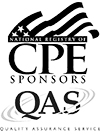Developing a Compliance and Ethics Training Program

Basic
Online
Description
Organizations have compliance and ethics programs in place to deter and detect fraud, illegality and employee misconduct so the company can protect its legal and financial health. For the programs to be effective, employees must understand its requirements, how to comply and where to find help.
In this course, you will learn about the elements of an effective compliance and ethics training program which include legal compliance, ethical decision-making skills, anti-fraud education and best practices. Additionally, you will learn how to create and assess a compliance and ethics training program.
Key Takeaways:
- Methods of assessing your organization’s compliance and ethics risks
- Benefits and challenges of compliance and ethics training
- Best practices for planning and administering the training program
- Methods of effectively assessing your compliance and ethics training program
- Best practices for developing the training content
Prerequisites
None
You Will Learn How To:
Identify best practices for creating an effective compliance and ethics program, including the U.S. Federal Sentencing Guidelines for Organizations
Recognize common methods of assessing the effectiveness of a compliance and training program
Identify best practices for planning a compliance and ethics training program, developing the training content and administering the training
Recognize basic concepts related to compliance and ethics, including best practices for making ethical decisions
Recall the benefits and challenges of compliance and ethics training
Table of Contents
| Chapter 1 | Lesson 1: Introduction to Compliance and Ethics |
|---|---|
| Chapter 2 | Lesson 2: Conducting a Compliance and Ethics Risk Assessment |
| Chapter 3 | Lesson 3: Creating a Compliance and Ethics Program |
| Chapter 4 | Lesson 4: The Benefits and Challenges of Compliance and Ethics Training |
| Chapter 5 | Lesson 5: Planning the Training Program |
| Chapter 6 | Lesson 6: Developing the Training Content |
| Chapter 7 | Lesson 7: Administering the Training |
| Chapter 8 | Lesson 8: Assessing the Training Program |
CPE Information
| CPE Credit: | 2 |
|---|---|
| NASBA Information: | Regulatory Ethics |
| Advance Preparation: | None |
| Last Updated: | May 2025 |
| Delivery Method: | QAS Self-Study |
Policies
CPE Credit
Please note: To be eligible for CPE credit, you must complete the final exam within one year of purchase date. You may only claim CPE credit for a course once.
ACFE Online Self-Study Courses
Features:
- 24/7 access to courses through your Internet browser
- Save time and quickly earn CPE credits with instant access, grading and printable certificate
- The flexibility to start or stop a course and pick-up right where you left off
- No additional shipping fees
Learn More about accessing your online self-study course
Learn More about online self-study courses and their features
System Requirements:
- Internet access: High-speed connection recommended
- Speakers required for video sound
 The Association of Certified Fraud Examiners, Inc. is registered with the National Association of State Boards of Accountancy (NASBA) as a sponsor of continuing professional education on the National Registry of CPE Sponsors. State boards of accountancy have final authority on the acceptance of individual courses for CPE credit. Complaints regarding registered sponsors may be submitted to the National Registry of CPE Sponsors through its website: www.nasbaregistry.org/.
The Association of Certified Fraud Examiners, Inc. is registered with the National Association of State Boards of Accountancy (NASBA) as a sponsor of continuing professional education on the National Registry of CPE Sponsors. State boards of accountancy have final authority on the acceptance of individual courses for CPE credit. Complaints regarding registered sponsors may be submitted to the National Registry of CPE Sponsors through its website: www.nasbaregistry.org/.
Ordering and Returns
Satisfaction Guarantee
If you are not 100% satisfied with any ACFE product, you may return it to us, provided it is in excellent condition, for a full refund of the item minus the cost of shipping. Toolkits and bundles may only be returned as a complete set.
Ordering & Returns Policy

